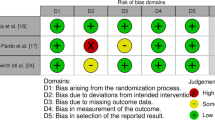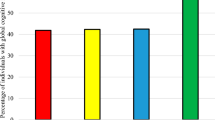Abstract
Vascular cognitive impairment (VCI) and focal post-stroke cognitive deficits are an unfortunately common occurrence. Despite this, our understanding of risk factors for development of VCI and treatment thereof is embarrassingly limited. While no FDA approved treatments exist for VCI, recent and ongoing research sheds some light on the problem, showing some efficacy of cholinesterase inhibitors and antidepressants, treatment of vascular risk factors, and other investigational drugs. Treatments for focal cognitive impairments such as aphasia and neglect are also limited, primarily by the size of studies that have been done. With the more widespread acceptance of the AHA-ASA diagnostic criteria for VCI and its subtypes, perhaps we will start to see more in the way of compelling treatment trials.
Similar content being viewed by others
References
Papers of particular interest, published recently, have been highlighted as: • Of importance •• Of major importance
Minino AM, Murphy SL, Xu J, Kochanek KD. Deaths: Final data for 2008. National vital statistics reports: from the Centers for Disease Control and Prevention, National Center for Health Statistics, National Vital Statistics System 2011;59:1–126.
Douiri A, Rudd AG, Wolfe CD. Prevalence of poststroke cognitive impairment: South London Stroke Register 1995–2010. Stroke. 2013;44:138–45.
Jorm AF, O'Brien JAD et al. The epidemiology of vascular dementia: An overview and commentary. In: O'Brien JAD, Gustafson L, editors. Cerebrovascular disease, cognitive impairment and dementia. 2nd ed. London: Martin Dunitz; 2004. p. 95–100.
Gorelick PB, Scuteri A, Black SE, et al. Vascular contributions to cognitive impairment and dementia: a statement for healthcare professionals from the American Heart Association/American Stroke Association. Stroke. 2011;42:2672–713. This is a statement from the AHA/ASA, which includes the new criteria for vascular cognitive impairment, as well as a review of recent literature.
Hachinski VC, Iliff LD, Zilhka E, et al. Cerebral blood flow in dementia. Arch Neurol. 1975;32:632–7.
Hachinski V. Vascular dementia: a radical redefinition. Dementia. 1994;5:130–2.
Roman GC, Tatemichi TK, Erkinjuntti T, et al. Vascular dementia: diagnostic criteria for research studies. Report of the NINDS-AIREN International Workshop. Neurology. 1993;43:250–60.
Chui HC, Zarow C, Mack WJ, et al. Cognitive impact of subcortical vascular and Alzheimer's disease pathology. Ann Neurol. 2006;60:677–87.
Schneider JA, Arvanitakis Z, Leurgans SE, Bennett DA. The neuropathology of probable Alzheimer disease and mild cognitive impairment. Ann Neurol. 2009;66:200–8.
Nyenhuis DL, Gorelick PB, Geenen EJ, et al. The pattern of neuropsychological deficits in Vascular Cognitive Impairment-No Dementia. (Vascular CIND). Clin Neuropsychol. 2004;18:41–9.
Hachinski V, Iadecola C, Petersen RC, et al. National Institute of Neurological Disorders and Stroke-Canadian Stroke Network vascular cognitive impairment harmonization standards. Stroke. 2006;37:2220–41.
McKhann G, Drachman D, Folstein M, Katzman R, Price D, Stadlan EM. Clinical diagnosis of Alzheimer's disease: report of the NINCDS-ADRDA Work Group under the auspices of Department of Health and Human Services Task Force on Alzheimer's Disease. Neurology. 1984;34:939–44.
Rascovsky K, Hodges JR, Knopman D, et al. Sensitivity of revised diagnostic criteria for the behavioural variant of frontotemporal dementia. Brain. 2011;134:2456–77.
Mesulam MM. Primary progressive aphasia–a language-based dementia. N Engl J Med. 2003;349:1535–42.
Sharp SI, Aarsland D, Day S, Sonnesyn H, Ballard C, Syst AsSVD. Hypertension is a potential risk factor for vascular dementia: systematic review. Int J Geriatr Psychopharmacol. 2011;26:661–9.
Rincon F, Wright CB. Vascular cognitive impairment. Curr Opin Neurol. 2013;26:29–36.
Pendlebury ST, Rothwell PM. Prevalence, incidence, and factors associated with pre-stroke and post-stroke dementia: a systematic review and meta-analysis. Lancet Neurol. 2009;8:1006–18.
Rockwood K, Mitnitski A, Black SE, Richard M, Defoy I. Iinvestigators vs Cognitive change in donepezil treated patients with vascular or mixed dementia. Can J Neurol Sci. 2013;40:564–71.
Birks J, McGuinness B, Craig D. Rivastigmine for vascular cognitive impairment. Cochrane Database Syst Rev. 2013;5, CD004744.
Ballard C, Sauter M, Scheltens P, et al. Efficacy, safety and tolerability of rivastigmine capsules in patients with probable vascular dementia: the VantagE study. Curr Med Res Opin. 2008;24:2561–74.
Roman GC, Salloway S, Black SE, et al. Randomized, placebo-controlled, clinical trial of donepezil in vascular dementia: differential effects by hippocampal size. Stroke. 2010;41:1213–21.
Farlow MR, Doraiswamy PM, Meng X, Cooke K, Somogyi M. The effect of vascular risk factors on the efficacy of rivastigmine patch and capsule treatment in Alzheimer's disease. Dement Geriatr Cogn Extra. 2011;1:150–62.
Jorge RE, Acion L, Moser D, Adams Jr HP, Robinson RG. Escitalopram and enhancement of cognitive recovery following stroke. Arch Gen Psychiatr. 2010;67:187–96. This study shows benefit over placebo and a nonblinded therapy arm in cognitive recovery after stroke using escitalopram, adding to the growing evidence for antidepressants, particularly SSRIs having a positive effect on post-stroke recovery.
Mikami K, Jorge RE, Adams Jr HP, et al. Effect of antidepressants on the course of disability following stroke. Am J Geriatr Psychiatr. 2011;19:1007–15.
Chollet F, Tardy J, Albucher JF, et al. Fluoxetine for motor recovery after acute ischaemic stroke (FLAME): a randomized placebo-controlled trial. Lancet Neurol. 2011;10:123–30.
Acler M, Robol E, Fiaschi A, Manganotti P. A double blind placebo RCT to investigate the effects of serotonergic modulation on brain excitability and motor recovery in stroke patients. J Neurol. 2009;256:1152–8.
Ogren SO, Eriksson TM, Elvander-Tottie E, et al. The role of 5-HT(1A) receptors in learning and memory. Behav Brain Res. 2008;195:54–77.
Santarelli L, Saxe M, Gross C, et al. Requirement of hippocampal neurogenesis for the behavioral effects of antidepressants. Science. 2003;301:805–9.
Espinera AR, Ogle ME, Gu X, Wei L. Citalopram enhances neurovascular regeneration and sensorimotor functional recovery after ischemic stroke in mice. Neuroscience. 2013;247:1–11.
Douiri A, McKevitt C, Emmett ES, Rudd AG, Wolfe CD. Long-term effects of secondary prevention on cognitive function in stroke patients. Circulation. 2013;128(12):1341–8. This study shows the effects of appropriate secondary prevention of vascular disease in first-time stroke patients on cognition.While there may be some confounding factors, since randomized control trials will not be done on secondary prevention in general, this serves as the best surrogate to date.
Cotroneo AM, Castagna A, Putignano S, et al. Effectiveness and safety of citicoline in mild vascular cognitive impairment: the IDEALE study. Clin Interv Aging. 2013;8:131–7.
Chen N, Yang M, Guo J, Zhou M, Zhu C, He L. Cerebrolysin for vascular dementia. Cochrane Database Syst Rev. 2013;1, CD008900.
Weinmann S, Roll S, Schwarzbach C, Vauth C, Willich SN. Effects of Ginkgo Biloba in dementia: systematic review and meta-analysis. BMC Geriatr. 2010;10:14.
Ihl R, Tribanek M, Bachinskaya N, Group GS. Efficacy and tolerability of a once daily formulation of Ginkgo biloba extract EGb 761(R) in Alzheimer's disease and vascular dementia: results from a randomised controlled trial. Pharmacopsychiatry. 2012;45:41–6.
Nelson M, Reid C, Beilin L, et al. Rationale for a trial of low-dose aspirin for the primary prevention of major adverse cardiovascular events and vascular dementia in the elderly: aSPirin in Reducing Events in the Elderly (ASPREE). Drug Aging. 2003;20:897–903.
Nelson MR, Reid CM, Ames DA, et al. Feasibility of conducting a primary prevention trial of low-dose aspirin for major adverse cardiovascular events in older people in Australia: results from the ASPirin in Reducing Events in the Elderly (ASPREE) pilot study. Med J Aust. 2008;189:105–9.
Gorelick PB, Nyenhuis D. Understanding and treating vascular cognitive impairment. Continuum. 2013;19:425–37.
SPRINT Systolic Blood Pressure Intervention Trial [online]. Available at: https://www.sprinttrial.org. Accessed 1 Sep 2013.
Chen CL, Ikram K, Anqi Q, et al. The NeuroAiD II (MLC901) in vascular cognitive impairment study (NEURITES). Cerebrovasc Dis. 2013;35 Suppl 1:23–9.
Allen L, Mehta S, McClure JA, Teasell R. Therapeutic interventions for aphasia initiated more than six months post stroke: a review of the evidence. Top Stroke Rehabil. 2012;19:523–35. This review nicely summarizes both drug trials and therapy options in post-stroke aphasia.
Berthier ML, Pulvermuller F, Davila G, Casares NG, Gutierrez A. Drug therapy of post-stroke aphasia: a review of current evidence. Neuropsychol Rev. 2011;21:302–17.
Hong JM, Shin DH, Lim TS, Lee JS, Huh K. Galantamine administration in chronic post-stroke aphasia. J Neurol Neurosurg Psychiatry. 2012;83:675–80.
Holland R, Crinion J. Can tDCS enhance treatment of aphasia after stroke? Aphasiology. 2012;26:1169–91.
Wong IS, Tsang HW. A review on the effectiveness of repetitive transcranial magnetic stimulation (rTMS) on post-stroke aphasia. Rev Neurosci. 2013;24:105–14.
Monti A, Cogiamanian F, Marceglia S, et al. Improved naming after transcranial direct current stimulation in aphasia. J Neurol Neurosurg Psychiatry. 2008;79:451–3.
Martins IP, Leal G, Fonseca I, et al. A randomized, rater-blinded, parallel trial of intensive speech therapy in sub-acute post-stroke aphasia: the SP-I-R-IT study. Int J Lang Com Dis. 2013;48:421–31.
Bowen A, Hazelton C, Pollock A, Lincoln NB. Cognitive rehabilitation for spatial neglect following stroke. Cochrane Database Syst Rev. 2013;7, CD003586.
Compliance with Ethics Guidelines
Conflict of Interest
HyungSub Shim declares that he has no conflict of interest.
Human and Animal Rights and Informed Consent
This article does not contain any studies with human or animal subjects performed by any of the authors.
Author information
Authors and Affiliations
Corresponding author
Additional information
This article is part of the Topical Collection on Stroke
Rights and permissions
About this article
Cite this article
Shim, H. Vascular Cognitive Impairment and Post-Stroke Cognitive Deficits. Curr Neurol Neurosci Rep 14, 418 (2014). https://doi.org/10.1007/s11910-013-0418-4
Published:
DOI: https://doi.org/10.1007/s11910-013-0418-4




